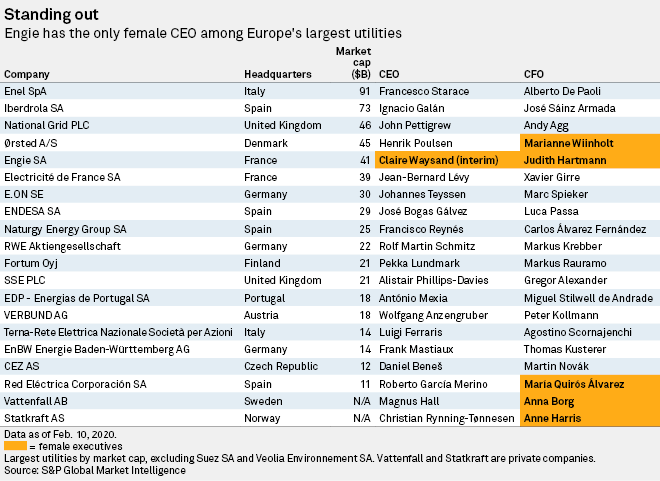The departure of one of the most high-profile CEOs in the European utility sector could leave the industry's biggest players without a single female CEO.
The board at French gas and power group Engie SA announced on Feb. 6 that it would not renew the mandate of Isabelle Kocher, who has led the company since 2016, effectively ousting her as chief executive.
Many initial commentators pointed out she was the only female CEO in France's blue-chip stock market index, but the same is true among Europe's largest listed gas and power utilities.
In addition, the sector's 18 largest companies by market capitalization, as well as the two biggest private utilities in Europe, only rack up five female CFOs between them. The list includes Engie, the only utility with a female leadership duo, Danish offshore wind giant Ørsted A/S and Spanish grid operator Red Eléctrica Corporación SA, as well as Vattenfall AB and Statkraft AS. The latter are fully owned by the governments of Sweden and Norway, respectively.
Independent power producers do not fare much better in terms of C-suite diversity. Germany's Uniper SE is headed by two men and EDP Renováveis SA, the wind power subsidiary of EDP - Energias de Portugal SA, has a male CEO and a male finance director, the company's effective CFO.
CEOs and CFOs are most powerful in shaping long-term company strategy and usually the most visible faces to investors and the wider public.
 |
While Engie's board looks for a permanent replacement for Kocher, it has appointed another woman, Claire Waysand, as interim CEO. The company did not respond to a request for comment on whether it would give special consideration to gender diversity in its search for Kocher's successor.
Gender balance has implications for company performance, according to a growing body of research. A study last year by Quantamental Research, a division of S&P Global Market Intelligence, found that companies with female CFOs are more profitable and companies with women as both CEO and CFO produced significantly better stock returns than those run by men.
Meade Harris, CEO of the Hawthorn Club, a network of female executives in the energy industry, said boards are starting to pay attention. Harris pointed to the recent announcement by Goldman Sachs Group Inc. CEO David Solomon, who said his company would no longer take any business public that does not have at least one diverse board member.
"It's a welcome move and it reflects what women have known for a while — companies with female board members and executives are more successful and the numbers bear this out," Harris said in an email.
Partly as a result, there is now a strong demand for female candidates, said Mark Goldsmith, business unit manager for the built environment at executive search firm Collingwood. Goldsmith said companies are increasingly recognizing that women bring benefits beyond hitting gender diversity targets, including better organizational skills and more effective and compliant performance overall.
"We are living in an exciting time in the energy industry, facing a multitude of opportunities and challenges, which women are particularly well suited to address," the Hawthorn Club's Harris said.

The gender mix among top executives at European utilities is broadly in line with wider stock market indices.
A 2019 study by European Women on Boards, an EU-sponsored nonprofit, found that only 28 companies in the Stoxx Europe 600 index have a female CEO, a 4.7% share compared with 5% in the much smaller utility sample.
The report pointed out that utilities and several other sectors, including financial services and media, had a greater gender balance in leadership positions. Among the 29 utilities in the index, which also includes water and waste utilities, women made up 35% of executive-level positions. This also includes the second and third levels of governance.
In the S&P 500, which only covers U.S.-based companies, women make up 5.8% of CEOs, according to a Jan. 15 report by Catalyst, another nonprofit.
Goldsmith, the headhunter, said that finding women for executive positions is complicated by the fact that there is a preexisting lack of senior-level women in many industries, including utilities.
"It's incredibly hard to offer my clients diversity in the shortlist," Goldsmith said, noting that some business areas such as compliance, health and safety, and project management have stronger pipelines of female candidates.



